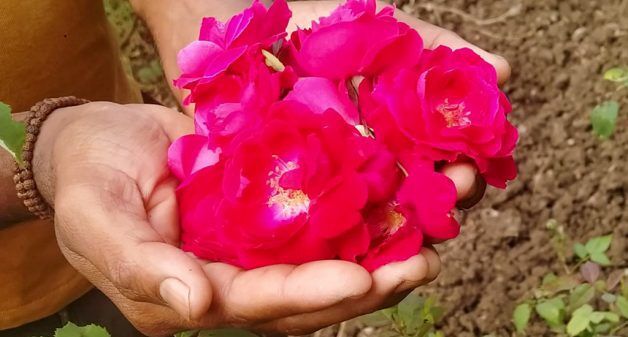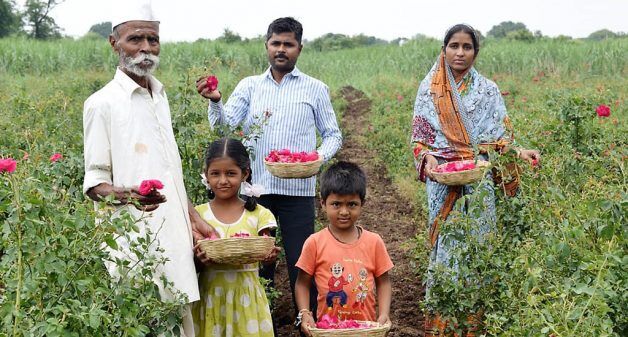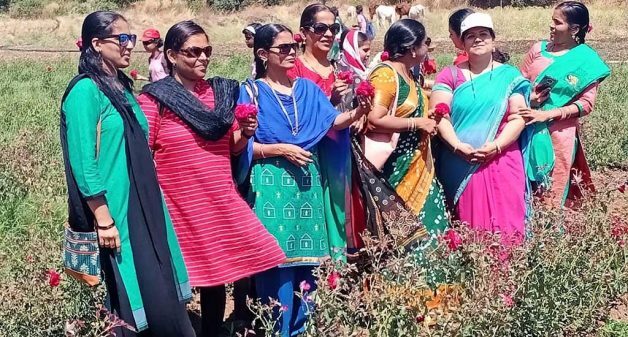
Desi rose brings sweet smell of success
A once drought-stricken village in Maharashtra today is full of “lakhpatis” thanks to cultivating and creatively selling the “desi rose” – known for its intense fragrance and use in rituals and festivities.

A once drought-stricken village in Maharashtra today is full of “lakhpatis” thanks to cultivating and creatively selling the “desi rose” – known for its intense fragrance and use in rituals and festivities.
This is the story of the desi rose from Maharashtra, India.
It’s four in the morning and the entire Kumhar household – young and the old alike – is out in the field braving the early December chill. Wearing mining torches, they nimbly pluck the blooming roses, wary of the wayward thorns.
They are not alone. Other families of the Wadji village in Maharashtra are there too, plucking roses in the same fields in which they once struggled to grow vegetables.
After a two-hour toil, picking buds that are just starting to open, the farmers leave the field, their bodies and clothes carrying the rich, sweet odour of the blooms.
The “desi rose,” a garden rose variety called Rosa centifolia, is known the world over for its heady scent, unlike hybrid roses which have a greater variety of colours but hardly any smell.
The collected flowers are packed in bags and the men happily rush to the Solapur market on motorcycles to sell their produce.
For Wadji was once a drought-stricken village.
But in the last 32 years it has emerged as a profitable hub of rose cultivation, earning the sobriquet of “rose village” and turning many poor farmers into prosperous “lakhpatis.”
While another farmer nearby had grown the flowers with little market success, it was the 340 families of Wadji who made desi roses a commercial success.

This is partly down to good, steadfast farming practices, but also the villagers’ creative flare for selling the bud to a town full of pious pilgrims.
Bordering Karnataka, Solapur is home to Maharashtrians, and Kannada and Telegu speakers. It is full of Hindu and Jain temples, mosques, dargahs and old tombs, as well as the iconic Shri Siddheshwar Temple.
It is no wonder the small city is never short of celebrations, as the locals say, “bara mahi utsavachi ghai” (always in haste to celebrate festivals all through 12 months).
And what is the favourite naivedya, or offerings, to the gods?
Roses. Loads of them.
Luckily for the farmers, it’s not just the gods and their holy places who are showered with this fragrant flower.
Over the years, roses have become an integral part of marriage celebrations too, so much that no wedding is complete without them.

And that is all thanks to rose farmers and brothers Parameshwar and Kundlik Kumhar, who had a brainwave of using bright, fragrant rose petals as confetti during a big wedding.
“It was sometime in 2012 that we came to know of plans for a mass wedding of 200 couples. We urged the organisers to use rose as akshata (confetti) instead of rice,” Kundlik Kumhar said.
The organisers agreed, saving 600 kg of rice to boot.
“Since then, most weddings in the city have been using roses, increasing their demand,” said Kundlik Kumhar.
Though used in weddings, they are rarely used to make garlands since the petals of Rosa centifolia (also known as cabbage rose) fall off early, unlike hybrid roses.
Many of the farmers – ever keen to capitalise on a market opportunity – have asked the local university to help so that the rose keeps its colour and fragrance but with petals that stay on longer.
“We’ve approached Mahatma Phule Krishi Vidyapeeth (MPKV), the agriculture university in Rahuri, and if this issue is addressed growers would get a better price,” said Vikram Phutane, the assistant technology manager of Solapur’s Agricultural Technology Management Agency.
But it is a delicate balance. While roses need very little water, they do require heavy fertilisation. But farmers only use organic fertilisers and pesticides since the flower’s natural oils are also used in food.
“We can’t use chemicals since we make food products from the petals,” said Kundlik Kumhar.
Roses bloom throughout the year – except when farmers prune and rest the plants for 45 days between October and December – and more profusely during monsoon.
Each acre yields 10 to 100 kg of roses a day, depending on the nourishment the bushes receive. Every day over 8 tonnes of roses valued at Rs 8 lakh are sold in the Solapur market, the rates ranging from Rs 70 to 200 per kg.
When the growers hurry to the market with the flowers at dawn, it’s for a reason.
“The earlier you are in the market, the more you make. An extra Rs 5 or 10 per kg,” said farmer Balaji Venkatesh Kadam.
Traders send one to two tonnes of roses packed in iceboxes, to Mumbai’s Dadar market daily.
“During festivals and the wedding season we get a good price,” said Parameshwar Kumhar, chairman of Sri Khandoba Agro Producer Company Ltd, a farmer producer company with 382 members. “Growing roses has ensured that each farmer makes between Rs 500 and 2,000 per day.”
But, like most agricultural produce, roses too are a victim of market fluctuations.
However, the farmers of Wadji have turned this to their advantage by making value-added products that protect their profits when the rose market softens.
“When the prices drop drastically, we make rose water or gulkand – a sweet preserve of rose petals. Soon we plan to manufacture incense sticks,” said Kundlik Kumhar, pointing to the factory in Wadji, built by the agro producer company.
In recent years the vast and fragrant rose fields – which spread over 400 acres – have become agro-tourism attractions too.

Not just for families looking for an outing to the country, but for educators too.
Last year the Kumhars hosted some 150 school children, teachers and others on a single day.
Growing roses has ushered in better times for Wadji’s farmers. Gone are the days when the uncertainty of vegetable prices ruled their lives.
Not just that.
The success of rose farming is setting a template for farmers in other districts, who are trying to replicate the sweet smell of Wadji’s success.
Hiren Kumar Bose is a journalist based in Thane, Maharashtra. He doubles up as a weekend farmer.